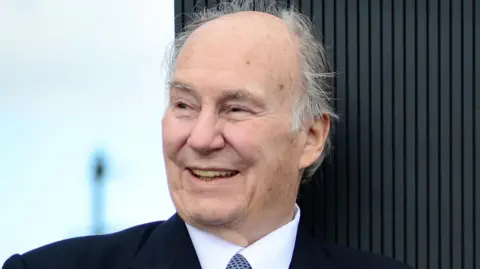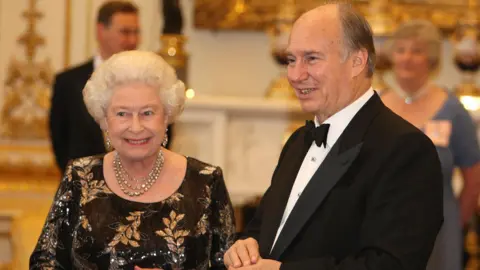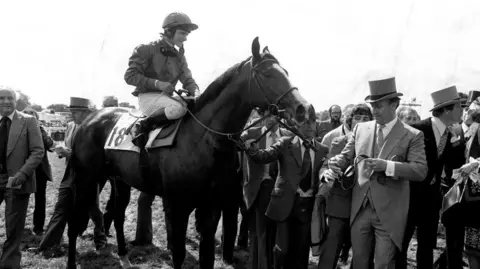Billionaire and spiritual leader the Aga Khan dies
 PA Media
PA MediaBillionaire philanthropist and spiritual leader Aga Khan has died at the age of 88, his charity the Aga Khan Development Network has announced.
Prince Karim Aga Khan was the 49th hereditary imam of the Ismaili Muslims, who say they are direct descendants of the Prophet Muhammad.
He "passed away peacefully" in Lisbon, Portugal, surrounded by his family, his charity said in a statement on social media.
Born in Switzerland, he had British citizenship and lived in a chateau in France.
King Charles is understood to be deeply saddened by the death of the philanthropist, who was a friend of both himself and his mother, the late Queen Elizabeth II, and is in touch with the family privately .
The Aga Khan's charities ran hundreds of hospitals, educational and cultural projects, largely in the developing world.
He enjoyed a lavish lifestyle, with a private island in the Bahamas, a super-yacht and a private jet.
The Aga Khan Development Network said it offered its "condolences to the family of His Highness and to the Ismaili community worldwide".
"We continue to work with our partners to improve the quality of life for individuals and communities across the world, as he wished, irrespective of their religious affiliations or origins," it added.
His successor, which will be one of his male descendants, will be named soon, the Aga Khan Development Network said.
The Ismailis are a Shia Muslim sect who revere a number of Imams, including Imam Ismail, who died in 765 AD.
They have a worldwide population of about 15 million, including 500,000 in Pakistan. There are also large populations in India, Afghanistan and parts of Africa.
 PA Media
PA MediaPrince Karim Aga Khan succeeded his grandfather as imam of the Ismaili Muslims in 1957 at the age of 20.
The prince had an estimated fortune of $1bn (£801m) in 2008, according to Forbes magazine. His inherited wealth was boosted by numerous business interests, including horse-breeding.
The prince was the founder of the Aga Khan Foundation charity and gave his name to bodies including a university in Karachi, and the Aga Khan Program for Islamic Architecture at Harvard University and the Massachusetts Institute of Technology.
The Aga Khan Trust for Culture was key to the restoration of the Humayun's Tomb site in Delhi. There is an Aga Khan Award for Architecture.
And he founded the Nation Media Group, which has become the largest independent media organisation in east and central Africa.
Pakistan's Prime Minister Shehbaz Sharif paid tribute to the prince describing him as a "man of vision, faith, and generosity" and a "remarkable leader".
"Through his tireless efforts in poverty alleviation, healthcare, and gender equality, he championed the cause of the marginalized, leaving an indelible mark on countless lives," he said.
Activist and Nobel Prize laureate Malala Yousafzai said: "His legacy will continue to live on through the incredible work he led for education, health and development around the world."
UN Secretary-General Antonio Guterres described him as a "symbol of peace, tolerance and compassion in our troubled world".
Beyond his global impact, much of his legacy will surround his horse breeding.
He became a leading owner and breeder of racehorses in the UK, France and Ireland, breeding Shergar, once the most famous and most valuable racehorse in the world.
 PA Media
PA MediaShergar won the Derby at Epsom in 1981 by 10 lengths in the Aga Khan's emerald green racing silks with red epaulets but was kidnapped in Ireland two years later and never found.
Despite losing his beloved horse, he told the BBC in 2011 - on the 30th anniversary of Shergar's biggest triumph - that he did not contemplate deserting his Irish breeding operation.
Of Shergar's triumph, he said: "It's a memory that can never, never go away.
"If you're in racing, the Epsom Derby is one of the greats. It always has been, so to win a race of that quality in itself is an extraordinary privilege. To win it the way he won it was more than that."
The Aga Khan went on to win the big race another four times with Shahrastani (1986), Kahyasi (1988), Sinndar (2000) and Harzand (2016).
